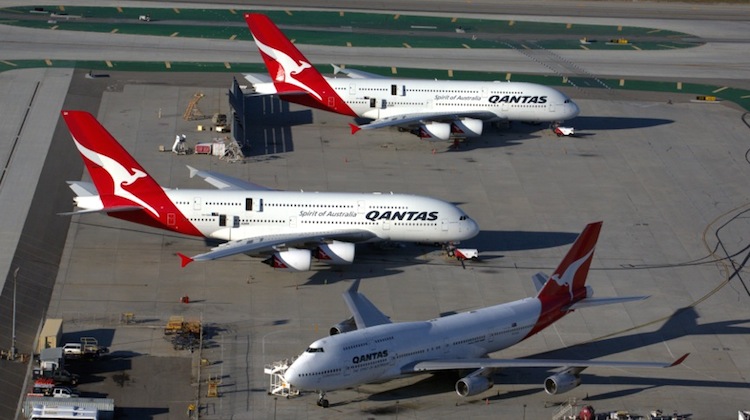
Qantas plans to fuel up its flights from Los Angeles to Australia with biofuel from 2020 thanks to a 10-year deal to purchase some 30 million litres of the renewable fuel as part of efforts to reduce carbon emissions.
The fuel would be produced by US-based SG Preston and comprise of a 50:50 split of renewable jet fuel and traditional jet fuel, Qantas said in a statement on Friday.
Qantas international and freight chief executive Gareth Evans said the company was also looking at adding biofuel flights beyond Los Angeles.
“The partnership with SG Preston is part of our commitment to lowering carbon emissions across our operations and sees us becoming the first Australian airline to use renewable jet fuel on an ongoing basis,” Evans said in a statement.
“As an airline group we are constantly looking for ways to become more fuel efficient and embrace new technologies and this partnership is a significant step on that journey.
“Through our biofuel program we are also exploring renewable jet fuel opportunities in Australia and continue to work with suppliers to develop locally produced biofuels for aviation use.
The airline said the SG Preston-produced biofuel was produced from non-food plant oils and was chemically equivalent to and met the same technical, performance and safety standards as conventional jet fuel emitted half the amount of carbon emissions per gallon over its life cycle.
Further, the renewable plant oils used to produce the biofuel did not compete with food production and met Qantas’s stringent sustainability certification requirements.
“Qantas is showing great leadership in its commitment to biofuels. We look forward to providing a high-performance renewable fuel for one of the most important routes on their international network,” SG Preston chief executive Randy Delbert said.
IATA director for environment Michael Gill congratulated Qantas and SG Preston on the initiative.
“Deals such as these are critical to the development of an aviation biofuel sector globally and the achievement of the aviation industry’s climate goals,” Gill said.
Qantas, and its low-cost-carrier unit Jetstar operated its first biofuel flight in 2012. The biofuel was made from used cooking oil.
The move follows the recent announcement of a two-year trial blending sustainable aviation fuel, or biojet, with traditional jet fuel for use on flights departing Brisbane as part of an initiative with Virgin Australia, Brisbane Airport, the Queensland Government and fuel supplier Gevo Inc.
Virgin Australia, which is coordinating the purchase, supply and blending of the fuels and will use the fuel on its flights departing Brisbane, said in a statement the initiative was the first time in this country that biojet would be supplied through an airport’s regular fuel supply system.
Further, Virgin Australia said the fuel was already being used on Virgin Australia flights departing Los Angeles to Brisbane, Melbourne and Sydney.
In October 2016, an overwhelming majority of the International Civil Aviation Organisation (ICAO) 191 member states agreed to the Carbon Offsetting and Reduction Scheme for International Aviation (CORSIA).
The landmark agreement has among its targets for the industry to achieve carbon neutral growth by 2020, and a 50 per cent reduction in CO2 emissions by 2050, compared with 2005 levels.
ICAO has also come up with a CO2 emissions standard, where aircraft will have to meet a maximum fuel burn per flight kilometre baseline which must not be exceeded. The standard would apply to new aircraft designs from 2020, while new deliveries of current in-production aircraft models would be subject to the CO2 standard from 2023.
Further, the ICAO measure also recommended a cut-off date of 2028 for production aircraft that did not comply with the standard.
Moreover, the International Air Transport Association (IATA) has set a target of an average improvement in fuel efficiency of 1.5 per cent per year from 2009 to 2020, as well as aspirations to build an aircraft that produced no emissions within 50 years.
Figures from IATA Showed air transport accounted for about two per cent of global man-made CO2 emissions. The figure has been relatively constant over the past 20 years and was not expected to increase beyond three per cent by 2050.




